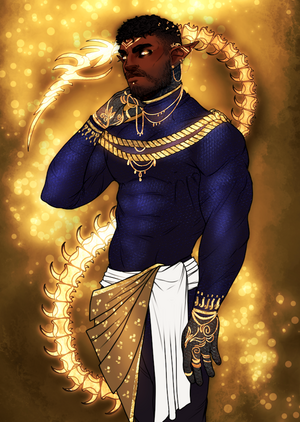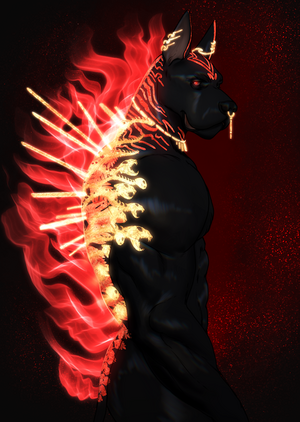Test1: Difference between revisions
No edit summary |
No edit summary |
||
| Line 1: | Line 1: | ||
Translation: | |||
* Xor + Ravaal = New crp head/murder hobo God | |||
* Onu + Pride Arken + Caius = New God based on Pride Arken | |||
* Ifrit = Triton | |||
* Eloba = retconned | |||
* Gahan = Gahan | |||
* Savellon = Rewritten as Apotheon | |||
* Armas + Sapphora + Halfvel = Design for Godborn, no clear plan yet | |||
* Morrlond = Kept, but it's conceptually very weak. | |||
* Ventra = Switching to general nature/hunting/elemental Goddess | |||
* Iorwerth = Going out through an IC event | |||
* Inth = Staying as is, it's just the best god | |||
===Apotheon, the Forceful Harmony=== | ===Apotheon, the Forceful Harmony=== | ||
{| | {| | ||
Revision as of 12:37, 10 April 2024
Translation:
- Xor + Ravaal = New crp head/murder hobo God
- Onu + Pride Arken + Caius = New God based on Pride Arken
- Ifrit = Triton
- Eloba = retconned
- Gahan = Gahan
- Savellon = Rewritten as Apotheon
- Armas + Sapphora + Halfvel = Design for Godborn, no clear plan yet
- Morrlond = Kept, but it's conceptually very weak.
- Ventra = Switching to general nature/hunting/elemental Goddess
- Iorwerth = Going out through an IC event
- Inth = Staying as is, it's just the best god
Apotheon, the Forceful Harmony
| Description |
Apotheon is a young Evolist God that was born from the collapsing chaos of the Allorn Empire and the anguish of that imperial demise. Even though modern sentiments to Elven diversification are settled, many still hold regard for a time when they were all one before ideologies divided them. Apotheon represents in his purest form this desire to re-unify, but rather than take any one ideology or form as superior, to absorb the good qualities of all the Elven peoples, to create the perfect being. He desires to combine the Teledden gift for Magic, the free will and creative mind of the Kathar, the Maquixtl bodily transformations, Isldar sharpness of consciousness and insight, the unrivaled martial skill of the Sihndar, the control over lesser beings of the Suvial, the physical prowess and beauty of the Fin'ullen, the attuned senses of the Gralathar, the self-control and discipline of the Lanlath, and the mental acuity of the Daresalar, to create something that the Dragons could never dream of. For this outcome, however, his subjects are rarely willing, either due to ideological dissent, or because the inherent process of being reduced to genetic matter and being absorbed to empower someone else, is violent and existentially horrific. Apotheon is not only a god for Elves, even non-Elves can attune their own body and mind to the perfect being by making use of Apotheon's gifts, as few can refute the perfected and honed skills and qualities of the Elves that are worthy of envy. Outside of the emphasis on creating the perfect being, Apotheon is also a patron of fine art, artificial beauty and the power of attraction. | |
| Virtues |
To Apotheon, it is virtuous to seek out those with qualities to be envied, whether born beauty, trained physique, acquired skill, or attuned traits and in essence to consume or steal them into the worshiper's own being. Apotheon's greatest virtue is a chase to become perfection itself and to trample whoever gets in the way. One specifically geared towards Elves is working towards the concept of Pan-Elvism, the idea that all Elves should re-unite as one perfect people, taking with them all the skills and honed traits to complement each other's faults and talents. Finally, a great virtue of Apotheon is to produce things of beauty, whether that means art, a beautiful painting or statue, or a macabre cabinet filled with jars with the congealed essences of beautiful and skilled people, all beautifully labeled and organized. | |
| Vices |
Apotheon's vices are the destruction and ruination of beauty and perfection. Anyone who destroys art, or the natural beauty of the land, or who disfigured for example a Sapphora Godborn. This also extends to the self, with Apotheon looking disfavorably upon sloth and laziness, upon the abuse of the body through meaningless opiates and indulgent over-eating, lethargy, and doing nothing. | |
| Mechanics |
All worshipers of Evolism are granted the gifts of Apotheon. The first is to be able to manifest or have Apotheon's golden tail (or in other aesthetic) by which they are able to extract the essence of a person by drawing blood, or consuming them wholly by draining all the liquid from their body and leaving behind a husk. From there, they can choose to manifest parts of the extracted/absorbed person's appearance, skills (like being good at art or cooking, but never Proficiencies) and in essence fuse them into their being. Changes applied to appearance never count as a Disguise, and cannot imitate a person. |
Gahan, the Demon Emperor
| Description |
Gahan is an ancient Evolist God that existed once as a God in his own right among the Dewamenet Gods, of the Aska (what would in the modern era become Baskarr) It is said among the Baskarr faithful that Gahan betrayed the Asha Gods when the Dewamenet Empire fell, fleeing with cowardice into the Void, becoming a Void God. As the Dewamenet Empire fell, and Evolist propaganda took over, the true version of events became unprovable, with Evolists claiming that Gahan stole the Dewamenet afterlife, and brought one to Evolism which had none. On his back, he carried the souls of millions of dead Asha, a prison of the Dewamenet Empire kept alive in the realm of the dead that is inaccessible to the living. When he entered the Void, he turned this prison into an army, and quickly set about conquering the hierarchies of the Spirit Dukes and Spirit Sovereigns, eventually becoming the Spirit Emperor of the Void. Now, all Spirit Sovereigns and Dukes fear and obey him, and all Spirits of the Void invariably serve him, with his own Demon Legion being one of the most formidable. In many ways, he is considered a rival to the Malefica of the Beyond, in that both command Spirits to the utmost, however, they are also oppositions of each other's ideologies. Where the Malefica seeks to end all life and free will in undeath, Gahan seeks in a way to preserve, turning the willing and unwilling into Demons of his host and spreading his influence. Gahan as a Spirit is immensely dangerous, bereft of By-laws and with unclear motives, whenever his personal involvement is suspected, many stay well clear. | |
| Virtues |
Because Gahan is in a way a Death-God and the doorway to the afterlife of Evolism, most of his virtues concern the proper passage of death. To Evolists, nothing is more humiliating or ruining to the power of one's soul than being denied a good death, and so it is virtuous to help other Evolist worshipers to a good end. This can include dying in battle in one final duel, being absorbed into one of Apotheon's greater perfections, or ascending into a Void Demon or being called back from the afterlife by an Evolist priest to protect a Temple or their flock. Another unexpected virtue for Gahan is solidarity. While many Evolism worshipers compete internally over power, they must always unite when external threats are posed, even if that sometimes means working with unsavory persons to resist external pressures. | |
| Vices |
Gahan's vices concern his hatred for inflexible and unpragmatic cowardice in stagnancy. What this more specifically means is choosing to die or be humiliated unheroically, and not racing with every fiber of one's being against diminishment imposed by others. On the eve of his own demise, Gahan willed himself into a hostile world, and bent and broke it to his will, showing there is always a way for a will. | |
| Mechanics |
All worshipers of Evolism are granted the gifts of Gahan. While in a Spirit Duke summoning, Evolists can call upon the insight of Gahan to peer through potential lies and double-speak of a Spirit Duke, to uncover hidden intentions. This won't allow a worshiper to fully understand the scope of the summoning interaction, but ward against unexpected traps or misleading that the Spirit Duke may be using to deceive the summoner. This Mechanic must be actively called upon during a Spirit Duke negotiation but can be called upon any number of times, though only by the person negotiating. |

